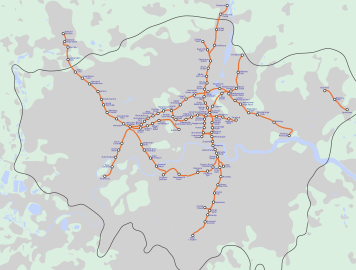Windrush line
The Windrush line is the service operated by London Overground on the East London line and South London line, running north to south through the East, Docklands and South areas of London. The East London line was previously a line of the London Underground. Prior to the name being adopted in November 2024,[1] the service was labelled in Transport for London timetables as the "Highbury & Islington to New Cross, Clapham Junction, Crystal Palace and West Croydon route".[2]
History
[edit]Renaming
[edit]The name proposed for this service in 2015 was the East London line.[3] In 2021, Sadiq Khan announced that if re-elected as Mayor of London, he would give the six services operated by London Overground unique names that would reflect London's diversity, working with his Commission for Diversity in the Public Realm.[4] In July 2023, TfL announced that it would be giving each of the six Overground services unique names by the end of the following year.[5][6] In February 2024, it was confirmed that the East London / South London section would be named the Windrush line (to honour the Windrush generation of immigrants to the area from the Caribbean) and would be coloured red on the updated network map.[7]
The Empire Windrush was a passenger vessel that arrived at Tilbury, in Essex, in 1948 bringing migrants to the UK from what was then the British West Indies. Before 1948, there were several areas in the UK, such as Canning Town in London, and Tiger Bay in Cardiff that had a black presence, but the arrival of the Windrush is seen as a watershed, after which point black people would form a much larger part of the community.
Services
[edit]As of November 2024[update], the typical off-peak service pattern is:[2]
| East London and South London lines (Windrush line) | ||
|---|---|---|
| Route | tph | Calling at |
| Dalston Junction to New Cross | 4 | |
| Dalston Junction to Clapham Junction | 4 |
|
| Highbury & Islington to Crystal Palace | 4 |
|
| Highbury & Islington to West Croydon | 4 |
|
On weekends, the Windrush Line operates overnight services between Highbury & Islington and New Cross Gate stations, with a frequency of four trains per hour.
Very few Windrush line trains on the South London line arm terminate at Battersea Park station instead of Clapham Junction station in the mornings and evenings. These operate as parliamentary trains.
Route map
[edit]London Overground | |||||||||||||||||||||||||||||||||||||||||||||||||||||||||||||||||||||||||||||||||||||||||||||||||||||||||||||||||||||||||||||||||||||||||||||||||||||||||||||||||||||||||||||||||||||||||||||||||||||||||||||||||||||||||||||||||||||||||||||||||||||||||||||||||||||||||||||||||||||||||||||||||||||||||||||||||||||||||||
|---|---|---|---|---|---|---|---|---|---|---|---|---|---|---|---|---|---|---|---|---|---|---|---|---|---|---|---|---|---|---|---|---|---|---|---|---|---|---|---|---|---|---|---|---|---|---|---|---|---|---|---|---|---|---|---|---|---|---|---|---|---|---|---|---|---|---|---|---|---|---|---|---|---|---|---|---|---|---|---|---|---|---|---|---|---|---|---|---|---|---|---|---|---|---|---|---|---|---|---|---|---|---|---|---|---|---|---|---|---|---|---|---|---|---|---|---|---|---|---|---|---|---|---|---|---|---|---|---|---|---|---|---|---|---|---|---|---|---|---|---|---|---|---|---|---|---|---|---|---|---|---|---|---|---|---|---|---|---|---|---|---|---|---|---|---|---|---|---|---|---|---|---|---|---|---|---|---|---|---|---|---|---|---|---|---|---|---|---|---|---|---|---|---|---|---|---|---|---|---|---|---|---|---|---|---|---|---|---|---|---|---|---|---|---|---|---|---|---|---|---|---|---|---|---|---|---|---|---|---|---|---|---|---|---|---|---|---|---|---|---|---|---|---|---|---|---|---|---|---|---|---|---|---|---|---|---|---|---|---|---|---|---|---|---|---|---|---|---|---|---|---|---|---|---|---|---|---|---|---|---|---|---|---|---|---|---|---|---|---|---|---|---|---|---|---|---|---|---|---|---|---|---|---|---|---|---|---|---|---|---|---|---|---|---|---|
| |||||||||||||||||||||||||||||||||||||||||||||||||||||||||||||||||||||||||||||||||||||||||||||||||||||||||||||||||||||||||||||||||||||||||||||||||||||||||||||||||||||||||||||||||||||||||||||||||||||||||||||||||||||||||||||||||||||||||||||||||||||||||||||||||||||||||||||||||||||||||||||||||||||||||||||||||||||||||||
Legend
| |||||||||||||||||||||||||||||||||||||||||||||||||||||||||||||||||||||||||||||||||||||||||||||||||||||||||||||||||||||||||||||||||||||||||||||||||||||||||||||||||||||||||||||||||||||||||||||||||||||||||||||||||||||||||||||||||||||||||||||||||||||||||||||||||||||||||||||||||||||||||||||||||||||||||||||||||||||||||||
| |||||||||||||||||||||||||||||||||||||||||||||||||||||||||||||||||||||||||||||||||||||||||||||||||||||||||||||||||||||||||||||||||||||||||||||||||||||||||||||||||||||||||||||||||||||||||||||||||||||||||||||||||||||||||||||||||||||||||||||||||||||||||||||||||||||||||||||||||||||||||||||||||||||||||||||||||||||||||||
References
[edit]- ^ Lydall, Ross (20 November 2024). "London Overground: New names and colours to be revealed at stations today after £6.3million rebrand". London Standard. Retrieved 20 November 2024.
- ^ a b "London Overground timetables". London: Transport for London. Retrieved 20 November 2024.
- ^ Davies, Rachael (15 February 2024). "These are what the Overground lines were nearly named in 2015: what do you think?". The Standard. Retrieved 23 November 2024.
- ^ Dispatch, Enfield (24 August 2023). "London Overground passengers invited to help give each line a unique name". Enfield Dispatch. Retrieved 23 November 2024.
- ^ "Naming London Overground lines". Transport for London. Retrieved 11 February 2024.
- ^ "London Overground lines to be given names". BBC News. 1 July 2023. Retrieved 11 February 2024.
- ^ London Overground: New names for its six lines revealed, BBC News, 15 February 2024



